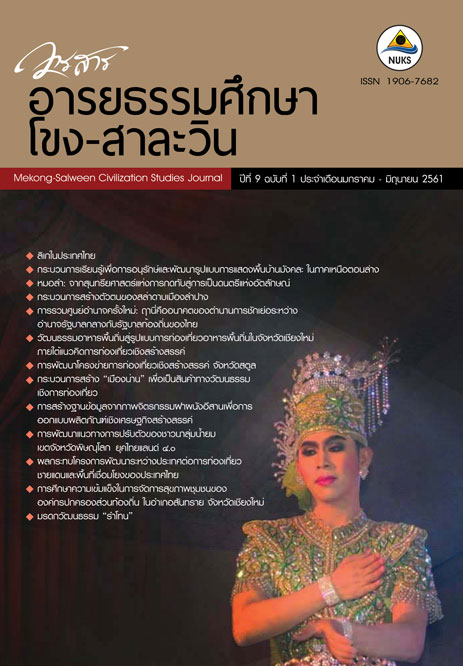The Learning Process for the Conservation and Sustainable Development of The Mangkala Performance in the Lower Northern of Thailand กระบวนการเรียนรู้เพื่อการอนุรักษ์และพัฒนารูปแบบการแสดงพื้นบ้านมังคละ ในภาคเหนือตอนล่าง
Main Article Content
Abstract
This research project entitled “Learning Conservation and Sustainable Development of The Mangkala Performance in the Lower Northern of Thailand aimed to 1) study the current conditions of the Mangkala performance; 2) create a guideline for the conservation and development of a Mangkala performance format using a learning process; and 3) develop a format for the Mangkala performance into an innovation with artistic, cultural and commercial values. The study was conducted using the qualitative research methodology including documentary studies and field studies to collect the data concerning the current conditions and the existence of the Mangkala performance. The study suggested that Mangkala was a type of musical band categorized as a fanfare and performed in processions, fanfares and rituals. However, due to the changing social conditions, the availability of other forms of entertainment and the performance format that did not correspond to the taste of modern-day society, Mangkala was disappearing from the ways of life of the people. To create a guideline for its conservation, therefore, required three-part cooperation from home, temple and school. The knowledge from folk philosophers was turned into learning media focusing on basic rhythms, note reading and practical training. Each learner received an authentic assessment and learned to analyse and apply the knowledge to create something new based on the local culture and history in the development of a Mangkala performance format. The findings revealed that in the learning process the basic understanding of the rhythms was extremely important and could be concretely integrated into practice. The folk philosophers had an important role in verifying the data. Direct experience in the ways of life and the understanding of the history and the community were important backgrounds and influenced the concepts and inspirations of the performance format. The format of performance was repeated in important religious events in the community, which was the role that Mangkala performance used to have in the old days, and in various activities as occasions allowed. This helped create an awareness of and pride in the local community and presented a guideline for increasing commercial values for future projects.
Downloads
Article Details
References
Duanpen, S. (2009, January). Journal of Rungruang Muang Bangklang. Bangklang Subdistrict Administrative Organization. 4(12).
Duanpen, S. Deputy Municipal Clerk of Naimuang district, Sawankalok, Sukhothai province . Interviewed on
March 12, 2015.
Makklay, Phramaha T. Wat Khoongtaphao, Khoongtaphao Sub-district, Uttaradit province . Interviewed
on March 23, 2015.
Meenak, T. Folk music philosophers of Chomtong District, Muang, Phitsanulok province. Interviewed on
February 9, 2014.
Srimuang, D. Folk music philosophers of Banlum Cultural Center, Sukhothai province. Interviewed on
January 22, 2014.
Wongpinit, P. Folk music philosophers of Wat Phrathat Phrafang, Phajook Sub-district, Uttaradit province.
Interviewed on March 24, 2015.
Wright, M. (1998). Farang klang Siam (Sinlapa Watthanatham : Art & Culture magazine) [Special issue].
Bangkok : Matichon, 172-175.


